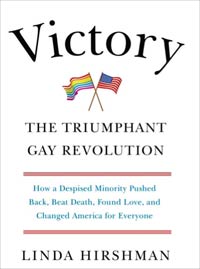 The issue of gay marriage has made local and national headlines for the past few weeks, with President Obama declaring his support last month, and with two gay rights groups filing a lawsuit against the clerk of Cook County last week. Good timing for a new work by former Chicagoan Linda Hirshman, whose third book, Victory: The Triumphant Gay Revolution is out today.
The issue of gay marriage has made local and national headlines for the past few weeks, with President Obama declaring his support last month, and with two gay rights groups filing a lawsuit against the clerk of Cook County last week. Good timing for a new work by former Chicagoan Linda Hirshman, whose third book, Victory: The Triumphant Gay Revolution is out today.
Late last week, I met with Hirshman (a graduate of the University of Chicago Law School with a PhD in philosophy from the University of Illinois at Chicago) to talk about her new book, as well as the Lambda Legal and ACLU lawsuits against Cook County, which challenge the constitutionality of state law denying same-sex marriage. (Since last year, gays here have been allowed civil unions.) Is it smart, I asked, to push for same-sex marriage through the courts instead of through the legislature? (Five state supreme courts—in Hawaii, Massachusetts, Connecticut, California, and Iowa—have declared denial of same-sex marriage unconstitutional). Hirshman answered with an emphatic “yes,” but she was particularly impressed by the wisdom of taking the state rather than federal court route: “The federal courts have been filled with Republican appointees, so people in the gay movement recognize that the federal courts are hostile.”
When I asked her if Illinois will eventually have gay marriage, she hedges: “The Illinois Supreme Court has been like the little girl with the little curl—very, very bad and very, very good.” But overall she sounds optimistic about the long run, telling me several times that there are “straight Mormons marching in the gay pride parade in Salt Lake City this year.” (Three hundred Mormons marched in yesterday’s Utah Pride Parade.)
A regular on op-ed pages in her role as a feminist activist—“the feminist movement was the story of my life”—Hirshman describes her first order of business in writing Victory as winning the confidence of the gay community. She apparently succeeded, as her roster of interviewees is replete with movers and shakers. The drive for full homosexual rights, she says, is the most successful civil rights campaign in American history. “My goal in writing this book was not just to write what happened; my goal was to figure out how they succeeded so brilliantly.”
I asked her how she could use the word “brilliant” to describe a movement that just saw North Carolina approve a constitutional amendment defining marriage as the union between a man and a woman. “It’s the South,” she said. “The South is always the last place to get it.”
Hirshman—whose husband, Chicago physician and hospital executive David Forkosh, recently died—now lives in New York, and she wrote Victory at a desk at the New York Public Library. About Chicago, where Hirshman, 68, lived for decades—and taught for many years at Chicago-Kent College of Law—she credits the city with a cohesive, strong gay community. She singles out Andersonville as a neighborhood in which gays settled “and did exactly what they do everywhere, which is to add value to their environment. My special project is to get a tax deduction for gays and lesbians because they add more value to society than they take back.” She also points to the “pivotal” role that the Howard Brown Health Center has played in the gay community.
That said, most of the action, she emphasizes, has been on the coasts—New York, San Francisco, and Los Angeles.
I asked Hirshman if she had tried to interview the president for her book. No, she answered, with a tone that prepared me for the coming criticism. While she concedes that Obama has been the best U.S. president on homosexual issues, including gay marriage, she hasn’t much respect for how he came to last month’s announcement that his “evolution” on the latter was over and that he now supports same-sex marriage. Describing an appearance on Chris Hayes’ MSNBC show UP, Hirshman told me that her fellow panelists—David Sirota of Salon, Richard Kim of The Nation, and LGBT activist Urvashi Vaid—agreed off-camera that Obama’s change of mind was, in essence, “an accident” of circumstance, forced by Vice President Joe Biden’s declaration of support for gay marriage. The president had not deliberately dispatched his vice president to pave the road; rather, Biden simply lost control of his caution and his tongue and said what he thought. “That would be consistent with other behaviors that we know of Biden,” Hirshman argues.
“I don’t think Obama’s Mr. Upright,” she adds. When I asked her about Obama’s support for ending “Don’t Ask Don’t Tell,” she says, “That was Congress. That wasn’t Barack Obama; it was [Senators] Joe Lieberman and Kirsten Gillibrand. There were many people I interviewed who believed that Obama’s people would have been just as happy to put it off.”
“I was a Hillary [Clinton] Girl,” Hirshman says. She maintains that Clinton would have been much more “courageous” on gay marriage. How so? I ask, given that she has not endorsed same-sex marriage even in the wake of her husband doing so, and, more importantly, in the wake of her boss’s declaration of support. Hillary will endorse gay marriage if she’s asked, Hirshman says. And she hasn’t been asked, Hirshman adds, because “I think people in the community know what she believes.”



